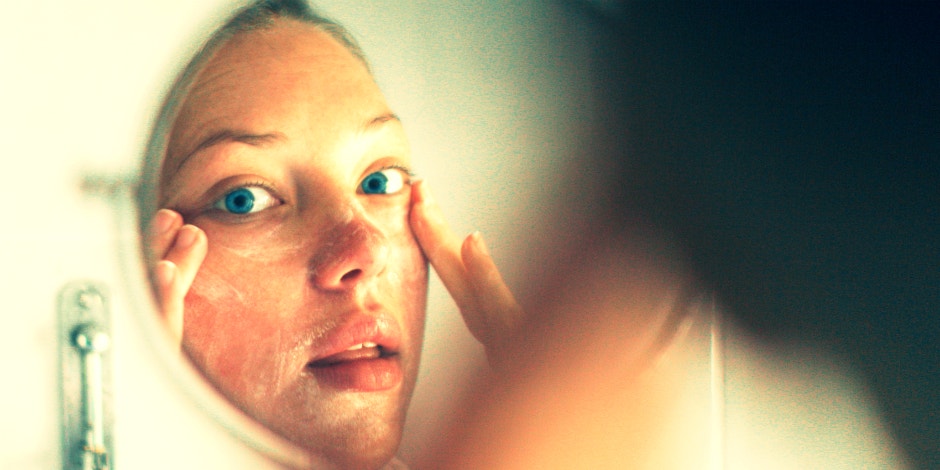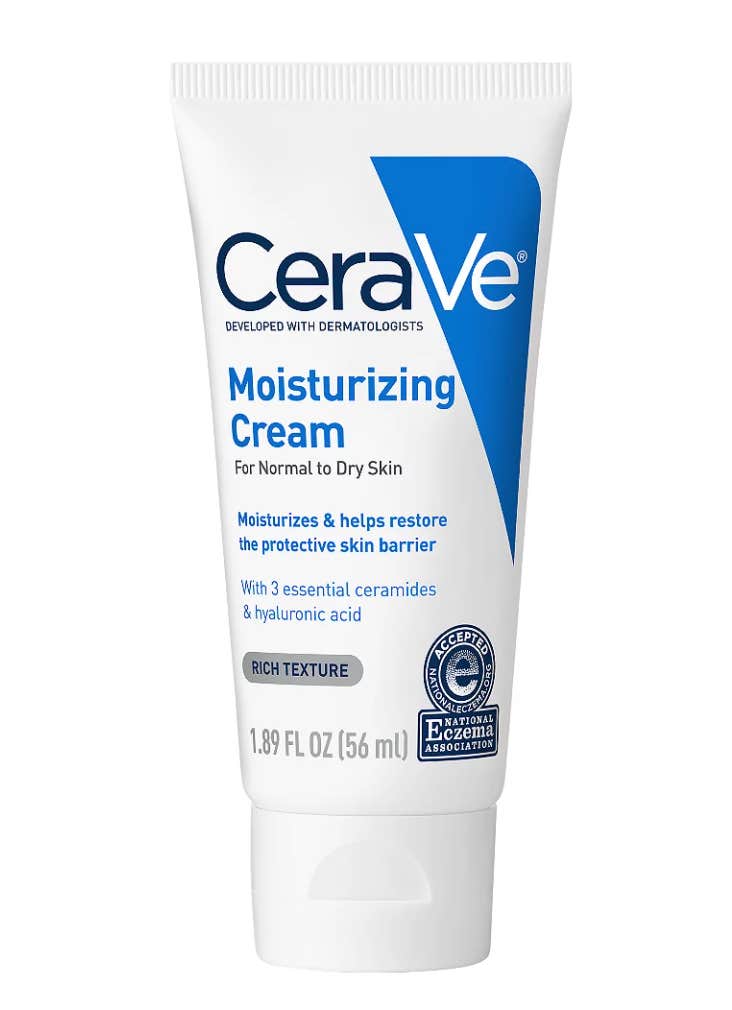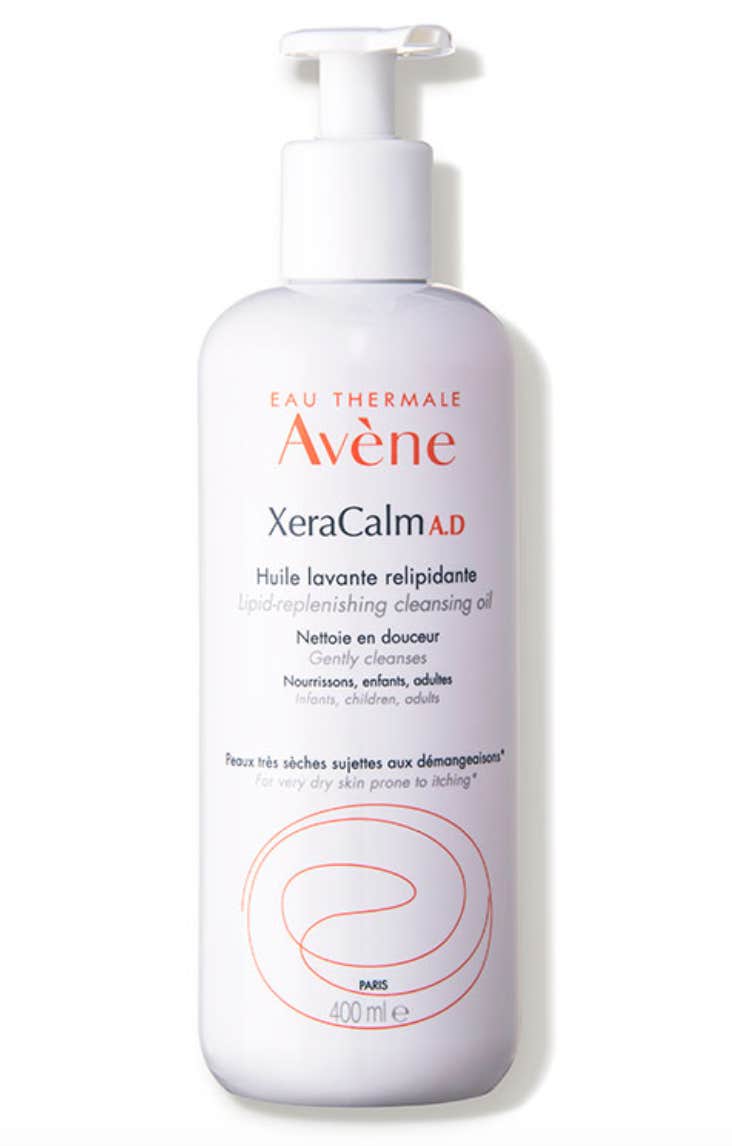Best Skin Care Routine For Perioral Dermatitis Relief
Have you ever had a bad skin day?
 Getty
Getty At the beginning of the pandemic, I noticed a cluster of zits by my mouth. They didn't go away, no matter what I tried. Benzoyl peroxide, salicylic acid, glycolic acid — I tried it all, yet none of the so-called best skin care routines helped.
As weeks turned into months, the zits spread to my eyes. I hid my face from everyone. I disabled my camera on zoom, wore makeup at home, stopped taking pictures of myself, and worst of all, I was picking at my skin nonstop.
I thought I was not taking care of my skin properly, so I booked a facial thinking that would solve my problems. The next day, my entire eye was covered.
That's when I decided to see a dermatologist who informed me I had been wrong all along — I was suffering from a rash, not acne. I had perioral dermatitis.
What is perioral dermatitis?
According to the American Osteopathic College of Dermatology, perioral dermatitis is a noncontagious facial rash that often gets mistaken for acne. It is usually around the mouth but may spread to the nose and eyes. It causes scaly skin, redness, itching, and burning.
Rare among men, it affects primarily young women, and can come and go for months or years.
What causes perioral dermatitis?
Unfortunately, perioral dermatitis is a relatively newly discovered skin disorder. Hence, doctors are unsure of what causes it, but some possibilities include:
Corticosteroid medication applied to the skin
Nasal or inhaled corticosteroid medications
Infections
Toothpaste containing fluoride
Cosmetic products
Sunscreens
Some foods
My doctor prescribed a medication to help clear up my rash, but she also suggested changes in my skincare routine.
Best Skin Care Routine for Perioral Dermatitis
Before my diagnosis, I was a Korean 10-Step Beauty Routine believer. Every morning and night, I used a toner, two serums, a face oil, two more serums, eye cream, and a moisturizer. I also supplemented this routine with face masks and sleeping masks.
What I didn't realize was my skincare routine was doing the opposite of taking care of my skin — it was the primary cause of my issue.
A big irritant for perioral dermatitis sufferers is thick products and products with fragrances.
Once I simplified my skincare routine, my skin cleared up. I haven’t had any issues since.
Here’s the skin care routine I recommend for perioral dermatitis relief.
1. Face Wash
In the morning, I wash my face with Glossier's Milky Jelly Cleanser. It's fragrance-free, and it's pH-balanced. It conditions the skin and leaves you feeling clean without that weird, tightening feeling most cleansers create.
 Photo: Amazon
Photo: Amazon
Glossier Milky Jelly Cleanser, check prices and reviews on Amazon
2. Toner
After cleansing, I use an AHA/BHA toner. I love Glossier’s Solution toner. It clears up regular acne without irritating my dermatitis!
 Photo: Amazon
Photo: Amazon
Glossier Exfoliating Skin Perfector, check prices and reviews on Amazon
3. Serum
Once the toner has dried, I like to apply Vitamin C serum to brighten and even my skin tone. Vitamin C is a great anti-inflammatory vitamin — this is super helpful for those with a face rash like perioral dermatitis. I use Sweet Chef's Vitamin C serum.
 Photo: Amazon
Photo: Amazon
Sweet Chef Ginger + Vitamin C Serum Shot, check prices and reviews on Amazon
4. Face oil
Some aspects of the Korean beauty routine were so relaxing that I couldn't give them up! After using a serum, I use a very lightweight facial oil like Herbivore's Orchid face oil. While it does have a fragrance, it is natural and not overpowering.
 Photo: Amazon
Photo: Amazon
Herbivore Orchid Facial Oil, check prices and reviews on Amazon
5. Moisturizer
Finally, to finish my morning, I use a fragrance-free moisturizer. I like the cult classic CeraVe.

CeraVe Moisturizing Cream, check prices and reviews on Amazon
It took a little bit of experimenting, but I’ve figured out that my skin is super sensitive to fragrance. If I try to use any fancy face washes or fragrant moisturizers, the next day my perioral dermatitis is back, so I try to keep it simple!
My nighttime routine is very similar to my morning routine, but I like to use a different cleanser at night to make sure all the makeup and dirt are removed from my face.
I love Avène’s XeraCalm Cleansing Oil. It's advertised to help with atopic dermatitis and eczema, and boy, it delivers! The formula prevents skin from drying out, and it deeply cleanses.
 Photo: Amazon
Photo: Amazon
Avène XeraCalm A.D. Lipid-Replenishing Cleansing Oil, $12
At night, I also use a niacinamide serum. Niacinamide helps with oil production and congested pores. Keeping my skin clear of oil is a significant factor for my dermatitis relief.
 Photo: Amazon
Photo: Amazon
The Ordinary Niacinamide 10% + Zinc 1%, check prices and reviews on Amazon
I follow up my serum with a night oil designed to reduce redness and protect the skin. I like Herbivore's Blue Tansy face oil.
 Photo: Amazon
Photo: Amazon
Herbivore Lapis Blue Tansy Face Oil, check prices and reviews on Amazon
Lastly, I apply a moisturizer. I like First Aid Beauty — their moisturizer is formulated with colloidal oatmeal, a skin protectant that relieves itching and irritation.
 Photo: Amazon
Photo: Amazon
First Aid Beauty Ultra Repair Cream, check prices and reviews on Amazon
While I haven’t eliminated my perioral dermatitis, I have learned to manage it. With a doctor's help and changing my skincare routine, I haven't had a flare-up in months. I don’t feel embarrassed by my face anymore.
The best piece of advice I can give you is to listen to your skin! Use products that have simple ingredients and no fragrance. Your skin is sensitive — treat it that way.
How is perioral dermatitis diagnosed?
To figure out if what you're experiencing is perioral dermatitis, head to your doctor or dermatologist. Typically, this condition can be diagnosed via visual examination. However, some doctors perform a skin culture test or a skin biopsy.
The prognosis for perioral dermatitis is favorable. The rash clears slowly, but once it’s clear, it only reoccurs if you go back to bad habits.
You can often get rid of it yourself by changing your skincare routine, though some will need to see a doctor to help.
This condition is treatable by your primary care doctor. Still, if you're looking for a dermatologist to help you with your recovery, you can visit the American Academy of Dermatology to locate a doctor near you!
Rachel Reed is a writer and editorial intern interested in news, culture, self, and relationships.
YourTango may earn an affiliate commission if you buy something through links featured in this article.

